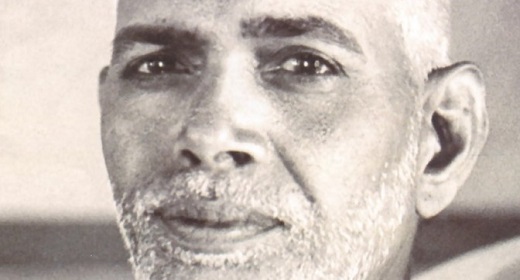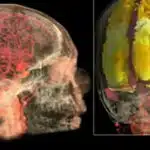Ramana Maharshi: It was about six weeks before I left Madurai for good that the great change in my life took place…
It was quite sudden. I was sitting alone in a room on the first floor of my uncle’s house. I seldom had any sickness and on that day there was nothing wrong with my health, but a sudden violent fear of death overtook me. There was nothing in my state of health to account for it, and I did not try to account for it or to find out whether there was any reason for the fear. I just felt “I am going to die” and began thinking what to do about it. It did not occur to me to consult a doctor or my elders or friends; I felt that I had to solve the problem myself, there and then.
The shock of the fear of death drove my mind inwards and I said to myself mentally, without actually framing the words: “Now death has come; what does it mean? What is it that is dying? “This body dies,” and at once dramatized the occurrence of death. I lay with my limbs stretched out stiff as though rigor mortis had set in and imitated a corpse so as to give greater reality to the enquiry. I held my breath and kept my lips tightly closed so that no sound could escape, so that neither the word “I” nor any other word could be uttered.
“Well then,” I said to myself, “this body is dead. It will be carried stiff to the burning ground and there burnt and reduced to ashes. But with the death of this body am I dead? Is the body I? It is silent and inert but I feel the full force of my personality and even the voice of the “I” within me, apart from it. So I am Spirit transcending the body. The body dies but the Spirit that transcends it cannot be touched by death. That means that I am a deathless Spirit.”
All this was not dull thought; it flashed through me vividly as living truth which I perceived directly, almost without thought-process. “I” was something very real, the only real thing about my present state, and all the conscious activity connected with my body was centered on that “I”.
From that moment onwards the “I” or Self focussed attention on itself by a powerful fascination. Fear or death had vanished once and for all. Absorption in the Self continued unbroken from that time on. Other thoughts might come and go like the various notes of music, but the “I” continued like the fundamental sruti note that underlies and blends with all the other notes. Whether the body was engaged in talking, reading or anything else, I was still centered on “I”. Previous to that crisis I had no clear perception of my Self and was not consciously attracted to it. I felt no perceptible or direct interest in it, much less any inclination to dwell permanently in it.
The consequences of this new awareness were soon noticed in my life. In the first place, I lost what little interest I had in my outer relationships with friends and relatives and went through my studies mechanically. I would hold an open book in front of me to satisfy my relatives that I was reading, ,when in reality my attention was far away from any such superficial matter. In my dealings with people I became meek and submissive. Going to school, book in hand, I would be eagerly desiring and expecting that God would suddenly appear before me in the sky. What sort of progress could such a one make in his studies at school!
One of the features of my new state was my changed attitude to the Meenakshi Temple. Formerly I used to go there very occasionally with friends to look at the images and put the Sacred Ash and Vermilion on my brow and would return home almost unmoved. But after the awakening I went there almost every evening. I used to go alone and stand motionless for a time before an image of Siva or Meenakshi or Nataraja and the sixty-three Saints, and as I stood there waves of emotion overwhelmed me.
The soul had given up its hold on the body when it renounced the “I-am-the-body” idea and it was seeking some fresh anchorage; hence the frequent visits to the temple and the outpouring o the soul in tears. This was God’s play with the soul. I would stand before Iswara, the Controller of the universe and of the destinies of all, the Omniscient and Omnipresent, and sometimes pray for the descent of His Grace upon me so that my devotion might increase and become perpetual like that of the sixty-three Saints. More often I would not pray at all but silently allow the deep within to flow on and into the deep beyond.
I stopped going out with friends to play games, and preferred solitude. I would often sit alone and become absorbed in the Self, the Spirit, the force or current which constituted me. I would continue in this despite the jeers or my elder brother who would sarcastically call me “Sage” or “Yogi” and advise me to retire into the jungle like the ancient Rishis.
When Nagaswami, Sri Bhagavan’s brother remarked, “What use is all this to such a one,” the meaning was obvious; that one who wished to live like a sadhu had no right to enjoy the amenities of home life. Venkataraman (Ramana) recognized the truth in his brother’s remark. Making the excuse that he had to return to school, he rose to his feet to leave the house then and there and go forth, renouncing everything. For him that meant Tiruvannamalai and the Holy Hill or Arunachala. Unconciously providing him with funds for the journey, his brother said, “Take five rupees from teh box downstairs and pay my college fees on the way.” Calculating the distance in an old atlas, he found that three rupees should suffice for the fare to Tiruvannamalai. Leaving behind a note and a balance of two rupees he started off for the railway station.
With quick steps, his heart throbbing with joy, he hastened straight to the great temple. In mute sign of welcome, the gates of the three high compound walls and all the doors, even that of the inner shrine, were open before him. He entered the inner shrine alone and stood overcome before his Father. Embracing the linga, in utter ecstasy, the burning sensation whih had began at Madurai vanished and merged in the linga of light, Arunachaleswara. There, in the bliss of union, was the journey ended.
Immediately upon leaving the temple, someone called out to ask whether he wanted his head shaved. Taking it to be the injunction of Sri Arunachala, he consented and was conducted to Ayyankalum Tank where a number of barbers plied their trade. There he had his head completely shaved. Then, standing on the steps of the tank, he threw away his remaining money—a little over three rupees. He never handled money again. He also threw away the packet of sweets which he was still carrying.
Discarding the sacred thread and wearing only a loin cloth, thus unintentionally completing the acts of renunciation, he returned to the temple. Hindu Scriptures enjoy a bath after a head shave. Although there had been no rain for a very long time, Sri Arunachala Himself came in the shape of a single cloud, which hovered directly overhead. Immediately there was a short, sharp shower so that before entering the temple he was given a bath.
Entering the thousand-pillared mantapam he sat in silent absorption, but being subjected to the pranks of local urchins he did not remain there long. Seshadriswami, a revered ascetic who had arrived at Tiruvannamalai a few years earlier, attempted to protect Brahmana Swami, as he was now known. These efforts were not very successful; in fact, at times they had the opposite effect. So Brahmana Swami sought refuge in the Pathala Lingam, an underground vault in the thousand-pillared hall.
The sun’s rays never penetrated this cave, which was inhabited by ants and vermin. So absorbed was he in meditation that he was completely oblivious when he was bodily carried out of the Pathala Lingam vault to the Subramanya Shrine. For about two months he stayed in the shrine absorbed in samadhi. Paying no heed to nourishment, food had to be put into his mouth, an he remained immersed in the effulgence of Bliss, barely conscious of his body, not speaking or moving, so that to onlookers it appeared to be the most intense tapas. It was not really tapas at all. He was simply ignoring the body he had ceased to need. He was already a Jivanmakta (liberated while alive) in unwavering consciousness of identity with the Self and had no karma left to wipe out, no further goal to attain.


















































